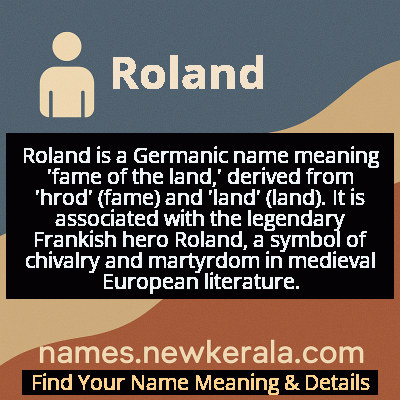Roland Name Meaning & Details
Origin, Popularity, Numerology Analysis & Name Meaning of Roland
Discover the origin, meaning, and cultural significance of the name ROLAND. Delve into its historical roots and explore the lasting impact it has had on communities and traditions.
Name
Roland
Gender
Male
Origin
Christian
Lucky Number
1
Meaning of the Name - Roland
Roland is a Germanic name meaning 'fame of the land,' derived from 'hrod' (fame) and 'land' (land). It is associated with the legendary Frankish hero Roland, a symbol of chivalry and martyrdom in medieval European literature.
Roland - Complete Numerology Analysis
Your Numerology Number
Based on Pythagorean Numerology System
Ruling Planet
Sun
Positive Nature
Leaders, ambitious, highly driven, self-reliant, innovative.
Negative Traits
Overly aggressive, domineering, impatient, selfish.
Lucky Colours
Red, orange, gold.
Lucky Days
Sunday.
Lucky Stones
Ruby, garnet.
Harmony Numbers
2, 3, 9.
Best Suited Professions
Entrepreneurs, managers, engineers.
What People Like About You
Courage, determination, leadership.
Famous People Named Roland
Roland the Paladin
Military Leader
Legendary Frankish commander and hero of medieval epic poetry
Roland Barthes
Literary Theorist
Revolutionized literary criticism and semiotic theory
Roland Garros
Aviator
Pioneering French aviator and WWI hero
Roland Emmerich
Film Director
Created some of Hollywood's most successful disaster films
Name Variations & International Equivalents
Click on blue names to explore their detailed meanings. Gray names with will be available soon.
Cultural & Historical Significance
This epic poem, composed around the 11th century, transformed Roland into an archetypal Christian hero whose story spread throughout Europe, influencing countless works of art, music, and literature. The name became synonymous with knightly virtues, loyalty, and sacrifice, embodying the ideal of Christian knighthood during the Crusades era. Throughout the Middle Ages, Roland statues appeared in numerous European cities as symbols of justice and civic freedom, while his legendary sword Durandal became an icon of heroic weaponry in Western culture. The cultural impact extended to place names, with Roland Garros stadium in Paris and numerous geographic features across Europe bearing his name, ensuring his legacy remains embedded in the cultural landscape.
Extended Personality Analysis
Individuals named Roland are often perceived as possessing strong, reliable character traits rooted in the name's heroic legacy. They typically exhibit natural leadership qualities, combining strategic thinking with practical wisdom—characteristics reminiscent of the legendary paladin's military prowess. Rolands tend to be principled and honorable, with a strong sense of duty and loyalty to their causes and relationships. Their decision-making often reflects careful consideration and moral integrity, making them trusted advisors and dependable friends.
Many Rolands demonstrate remarkable resilience in facing challenges, drawing inner strength from adversity much like their namesake at Roncevaux Pass. While they can be traditional in their values, they also possess the courage to defend their beliefs against opposition. Socially, Rolands often command respect through their competence rather than seeking attention, and they typically balance confidence with humility. Their combination of intellectual depth and practical action makes them effective in both professional and personal spheres, often excelling in roles that require both strategic vision and hands-on implementation. The name seems to carry an expectation of reliability and substance that many bearers naturally grow into throughout their lives.
Modern Usage & Popularity
In contemporary usage, Roland maintains a distinguished presence while experiencing fluctuating popularity trends. The name enjoyed significant popularity in the early 20th century, particularly in English-speaking countries, but saw a gradual decline from the 1950s onward. However, recent years have witnessed a modest resurgence as parents seek classic, strong names with historical depth. In the United States, Roland currently ranks around #500 in baby name popularity, representing a sophisticated choice that stands out without being overly unusual. The name remains particularly strong in European countries like Germany, France, and Hungary, where its historical connections maintain cultural relevance. Modern Rolands often appreciate their name's blend of traditional strength and distinctive character, with many successful professionals in law, academia, and business carrying the name. The recent trend toward vintage revivals and literary-inspired names has brought renewed attention to Roland, positioning it as an attractive option for parents seeking a name with both heritage and character that transcends fleeting naming fashions.
Symbolic & Spiritual Meanings
Symbolically, Roland represents the enduring ideals of heroism, loyalty, and principled strength. The name evokes the archetype of the noble warrior who remains steadfast in adversity, much like the legendary Roland who chose death over surrender. It symbolizes the intersection of earthly fame and spiritual devotion—a warrior who fights for both king and God. The blowing of Roland's horn Olivant at Roncevaux Pass has become a metaphor for ultimate sacrifice and the call for aid in desperate circumstances. In broader cultural symbolism, Roland represents the defense of civilization against chaos, the protection of vulnerable communities, and the moral responsibilities of power. The name carries connotations of boundary-marking and protection, referencing the historical Roland statues that often marked city limits and jurisdictions. Psychologically, Roland symbolizes integrated masculinity—combining strength with compassion, authority with service, and action with reflection. The enduring appeal of the name across centuries speaks to its powerful symbolic resonance with fundamental human values of honor, courage, and lasting legacy that continue to inspire across generations.

